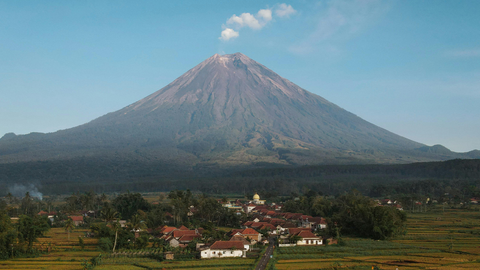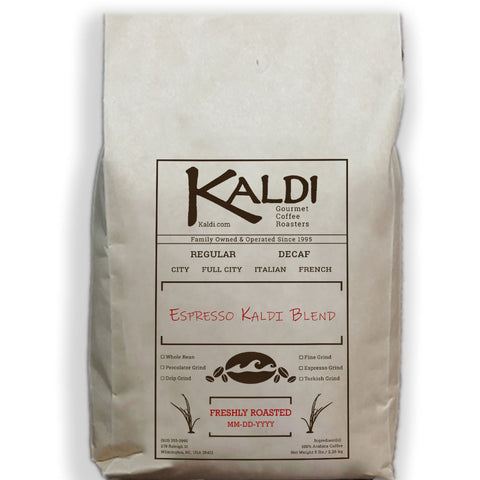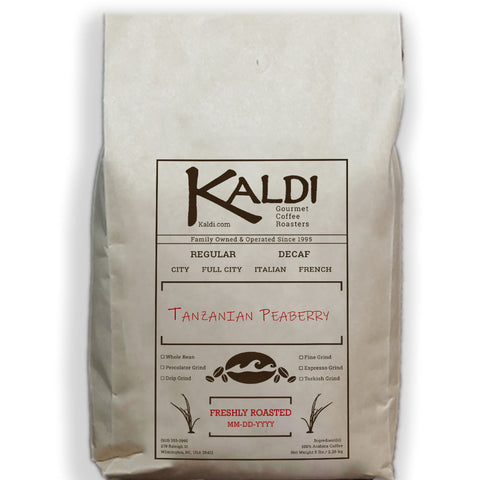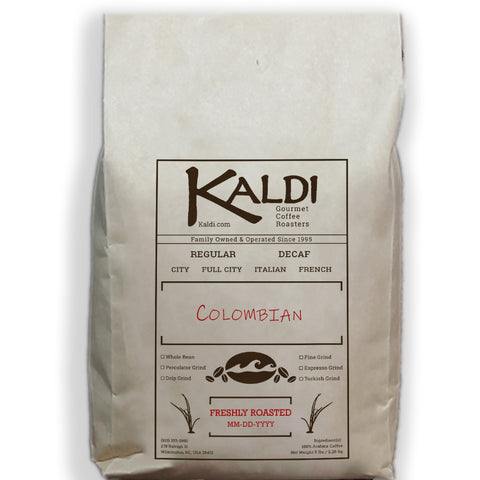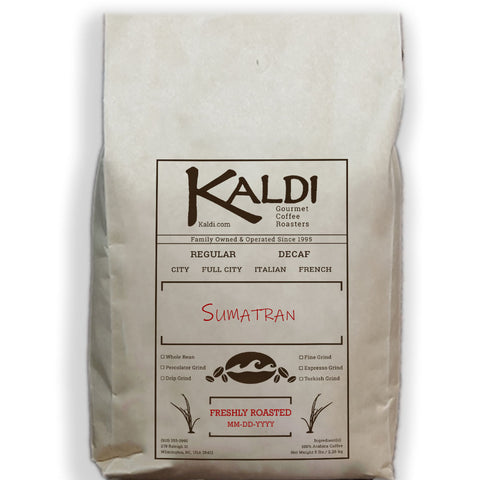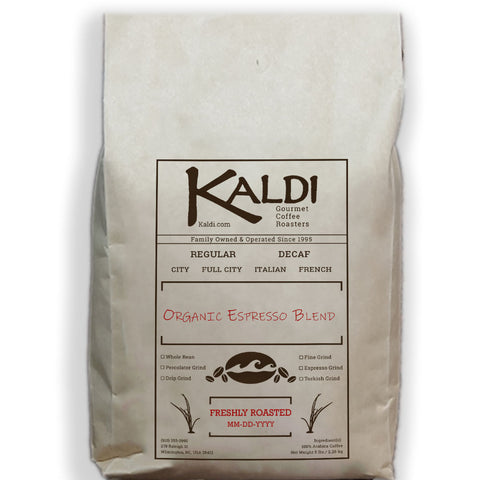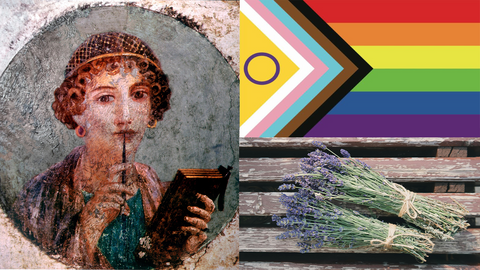As we close out Asian American, Native Hawaiian, and Pacific Islander Heritage Month, Kaldi Gourmet Coffee Roasters wanted to take a moment to highlight some of the finest coffees from these culturally rich regions that we offer. Our carefully selected beans of Celebes Sulawesi Kalossi, Indian Monsoon Malabar, Java Jampit, Papua New Guinea A Grade, and Sumatran Mandheling not only bring diverse flavors to your cup but also tell a story of heritage, community, and tradition.
Celebes Sulawesi Kalossi
Origin and Community:Nestled amidst the Rante Karua mountains of Indonesia's Sulawesi island, Celebes Sulawesi Kalossi coffee thrives in the Toraja region. It got its name from the nearby town of Kalossi. This coffee boasts a deep-rooted history that's become synonymous with the community.
Cultural Significance:Coffee cultivation in Sulawesi began around 1750, with these beans initially reserved for European royalty due to their rare and elegant character. Today, coffee remains a vital part of the local economy and culture. Farmers meticulously cultivate the beans alongside other staples rice and sugar, showcasing the region's agricultural abundance.
Flavor Profile:Celebes Sulawesi Kalossi is celebrated for its full-bodied richness, balanced acidity, and complex, earthy undertones. The volcanic soil of the Toraja region imparts notes of dark chocolate, ripe fruit, and a hint of spice. |
|
Indian Monsoon Malabar
Origin and Community:Hailing from the Malabar Coast of India, Indian Monsoon Malabar coffee undergoes an unparalleled journey. The beans are exposed to the monsoon winds, resulting in a distinctive flavor profile that has become a cherished part of the region's identity. Farmers along the Karnataka, Kerala, and Tamil Nadu coasts have embraced this rare process for generations.
Cultural Significance:Coffee is more than just a beverage in India, especially in the southern states. The monsoon Malabar coffee embodies this cultural significance. The process mimics the natural aging that beans underwent during sea voyages in the British colonial era, showcasing the resourcefulness and vibrant history of the region.
Flavor Profile:Indian Monsoon Malabar coffee is known for its smooth, mellow character with low acidity. The beans develop a succulent, full-bodied taste with hints of spice, nuts, and earthiness, making it a favorite among coffee connoisseurs. |
|
Java Jampit
Origin and Community:Java Jampit coffee hails from the Ijen Plateau on the eastern Indonesian island of Java. This region is renowned for its volcanic soil, which imbues the coffee beans with an anomalous mineral character. The Jampit Estate, one of several large government-run estates established by the Dutch in the 18th century, is home to these meticulously hand-picked beans.
Cultural Significance:Coffee cultivation in Java dates back to the 17th century when Dutch colonists first introduced the bean. Over time, it has become woven into the fabric of local life. The Jampit Estate itself is a tribute to Javanese culture, with many workers living on the grounds in villages alongside the coffee plants. Traditional practices are still employed, ensuring a connection to the island's deep coffee history.
Flavor Profile:Java Jampit coffee is known for its bright acidity, medium body, and complex flavor profile. Unlike many other Indonesian coffees, Java Jampit undergoes a wet processing method, resulting in a cleaner, more balanced cup. Hints of chocolate, fruit, and spice dance on the palate, offering a delightful and well-rounded coffee experience. |
|
Papua New Guinea A Grade
Origin and Community:Papua New Guinea A Grade coffee thrives in the rich volcanic soil and high altitudes of the island nation's highlands. These ideal growing conditions, coupled with meticulous farming practices, contribute to the exceptional quality of the beans. Coffee farming plays a significant role in the social and economic structure of the highland communities, with many families depending on its success.
Cultural Significance:Coffee was introduced to Papua New Guinea in the late 19th century and quickly became a major agricultural product. The cultivation and processing of coffee beans are deeply intertwined with the cultural identity of the highland people. Traditional knowledge passed down through generations ensures the production of exemplary coffee while also preserving a vital part of the region's heritage.
Flavor Profile:Papua New Guinea A Grade coffee boasts a vibrant acidity and full-bodied flavor. Floral notes and tropical fruit undertones create a delightful aroma, while the clean, crisp finish leaves a refreshing taste. This coffee is a true reflection of the outstanding environment and dedication of the Papua New Guinea people. |
|
Sumatran Mandheling
Origin and Community:Sumatran Mandheling coffee is cultivated on the volcanic slopes of Mount Leuser in the Batak area of Aceh, Indonesia. The matchless climate and soil conditions of the region contribute to the coffee's distinctive characteristics. The Batak people, known for their lustrous cultural heritage, have shaped Sumatra's coffee industry, ensuring the beans retain their individualized character for generations.
Cultural Significance:Coffee is not just a commercial product for the Batak people; it's a cornerstone of their social life and cultural identity. Traditionally, coffee ceremonies hold immense significance, serving as a space for community gatherings, welcoming guests, and celebrating important occasions. The meticulous preparation and shared enjoyment of Sumatran Mandheling coffee strengthen social bonds and serve as a powerful symbol of Batak hospitality. Furthermore, coffee cultivation is a core part of the Batak economy, providing a sustainable livelihood for many families and contributing to the region's overall prosperity.
Flavor Profile:Sumatran Mandheling coffee is prized for its deep, syrupy body and low acidity. The unique processing methods employed by the Batak people result in a complex and full-flavored cup. Luscious, earthy notes with hints of dark chocolate, herbs, and a touch of spice create a truly satisfying coffee experience. Each sip is a testament to the skill and dedication of the Batak people. |
|
Explore the World Through a Cup
Travel the world with Kaldi Gourmet Coffee Roasters! Each cup highlighted above is merely a gateway to these regions' vibrant cultures and histories. Celebrate the resilience and achievements of these communities by savoring the flavors they have cultivated with passion. Enjoy every coffee mentioned and boundless coffee from across the world in any roast of your choice at Kaldi.com.

